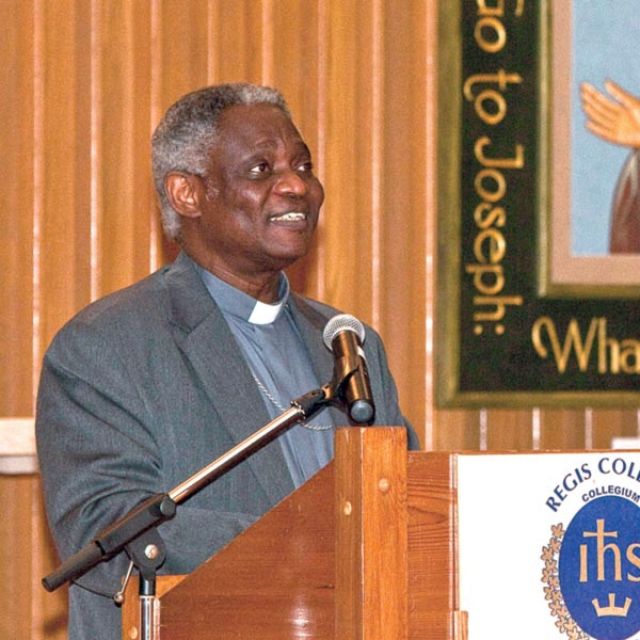TORONTO - The New Evangelization that anchors Pope Benedict XVI’s call for a Year of Faith looks a little different from an African perspective, Cardinal Peter Turkson told a capacity audience at the Regis College chapel in Toronto.
The Ghanaian cardinal who heads up the Pontifical Council for Justice and Peace delivered the Martin Royakers Lecture Sept. 26, speaking about “Vatican II: A Council of Justice and Peace.” He also spoke with The Catholic Register in an exclusive interview.
For African Catholics the New Evangelization is a challenge to form better leaders in the Church and society, and an invitation to deepen the commitment of all Christians to the body of Christ, Turkson said.
Since the Second Vatican Council the African Church has grown to a degree almost inconceivable to the Churches in North America and Europe, Turkson said. From 29 million Catholics in 1962 to 186 million today, Africa’s Catholic population has grown 541 per cent.
The old image of Africa as a mission land under the tutelage of European and North American priests and sisters is beginning to fade. Between 1962 and 2012 African- born priests have risen from just 15,000 to more than 40,000. Seminaries are bursting. There were 26,000 religious women from Africa in 1962, compared to 68,000 today.
Many Africans have become missionaries to underserved regions of Canada, the United States and Europe.
It seems that the old evangelization worked.
“We did teach people the catechism and we did baptize them,” Turkson told The Catholic Register.
But that doesn’t mean Africa doesn’t now need the New Evangelization — a concept first spoken about by Pope John Paul II at a meeting of the bishops of Latin America in Puebla, Mexico, in 1979.
Just as the majority of African Catholics trace their Catholic roots to the great ecumenical council of 1962-1965, the majority of African nations were released out of colonialism either just before or during Vatican II.
“The educated elite, the educated class that emerged in the emerging states, mostly was educated in mission schools,” pointed out Turkson.
Unfortunately they included corrupt politicians such as Zairian President Mobutu Sese Seko, who amassed a personal fortune of some $5 billion, and Robert Mugabe, still in power in Zimbabwe.
“That has caused several Church leaders in Africa to sit back and think, ‘What did we do wrong?’ ” said Turkson.
But it isn’t just the politicians and business leaders of the continent that worry African bishops. In Turkson’s native Ghana almost a quarter of the population is Pentecostal, compared to just 15 per cent who are Catholic. Many people opt for a simpler, more personal, more emotionally expressive brand of faith.
What’s missing in the merely intellectual and notional religion of Africa’s leaders and the purely personal religion of the poor is the social doctrine of the Church, Turkson said.
“But their social consciousness, what we now call the social doctrine of the Church, wasn’t taught much. That was missing. People became Christians but the transition — the fact they were Christian — did not impact much on their social lives. That is something we are now discovering,” he said.
Just recording baptisms won’t do any more. Nor will mere catechism lessons make Christians.
“That is not quite the experience of conversion,” he said. “The Evangelical movement is appealing more to the heart, with lively music, lively prayer, the power of the spiritual world.”
All of that is embedded in the Catholic way of living out the sacraments, but it has to be uncoveredand presented in new ways, said Turkson.
“We need to find a way of bringing it down to basically these needs — to people’s life situations,” he said. “All of that serves as vehicles of God’s grace.”
He believes Catholic parish life has to afford people more opportunities to bear witness and testify to their faith.
“The world is now looking for witnesses,” he said. “We don’t make it alive. We don’t make it come alive in such a way that it encourages them, motivates them, touches their lives in faith. It would be great if we fashioned a little space in our worship for moments like that.”


